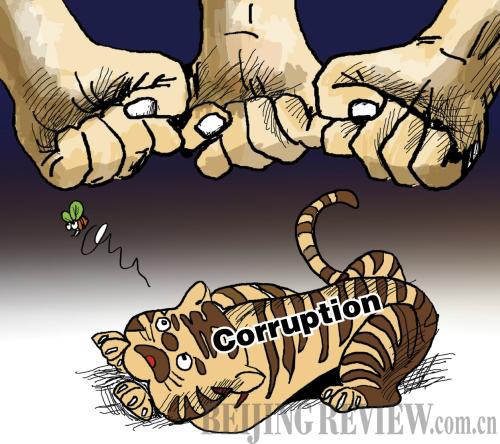|
 |
|
(CFP) |
The Communist Party of China resolved to fight corruption with an iron fist and build a cleaner system of politics at the 18th National Congress in November 2012. Since then, the Party has worked out a series of measures to eradicate the root of corruption. In 2013, 18 ministerial and provincial-level officials were investigated. In the first eight months of the year alone, 129 officials above the bureau level were placed on file for investigation. These unprecedented efforts in fighting corruption are drawing attention at home and abroad.
In the face of these achievements, keeping a calm mind is more important than ever before. Corruption remains a frequent phenomenon and the hotbed for corruption is present, and so the fight against corruption is still an onerous and complicated battle. Although punitive measures may achieve immediate results, they are incapable of undermining the foundations of the corruption. Many corrupt officials are targeted in isolation, while anti-graft agencies and the relevant measures they take have not yet cohered into a larger system. All of these show that the various current anti-corruption efforts have not yet synergized. While persisting to strike out at both "tigers" and "flies," it's also necessary to be alert to flaws in the process and try to find new ways of preventing failure in anti-corruption.
Fragmented anti-corruption actions
It can be said that one pillar alone is unable to support a whole edifice, which implies that no social force alone is able to tackle the problem of corruption. Legislative, judicial, administrative and anti-corruption agencies, the mass media, the civil society, and international organizations are the major pillars supporting a clean government. Thus, every pillar must be strong enough and rely on each other to solidly support the structure of the state. If any of these pillars weakens, the whole weight will have to be spread to the rest of the pillars. If the weight is put totally on one pillar, even if it is very strong, it cannot help but buckle and collapse from the stress.
The pillars that support the edifice of clean governance can be divided into two categories: one is the government power-based anti-corruption actions; the other is social anti-corruption efforts, as represented by online anti-corruption activities. Neither top-down actions by the government nor bottom-up efforts by citizens in themselves will be able to extract the malignant tumor of corruption.
When one or more effective anti-corruption measures are pushed to the front lines of the anti-corruption battle, corruption will appear to be an isolated island in the middle of the ocean. Corruption tends to be intertwined with inefficient social codes and system loopholes, and thus a single prescriptive action is not enough to eradicate deep-rooted corruption. The official property publicity system, which is seen as a cutting-edge anti-corruption tool, is unable to cope with the difficulty of combating corruption in China. Without supports such as citizens' fixed assets registration, the financial system of juridical persons and citizens' tax payment system, corrupt officials can easily hide or transfer their illegal incomes. Effective anti-corruption measures will function only in certain conditions. The lack of proper contingencies and well-developed supportive measures will result in malfunctions of an otherwise perfect system. Once the "island effect" is derogated and publicized, the originally well-received anti-graft measures will be subject to public cynicism and eventually abandoned. The existence of the "island effect" requires us to improve the conditions for adopting anti-corruption measures.
Corruption in modern society is stimulated by modernization and the inadequate institutionalization of politics. Corruption is most rampant at a time when society and economy is speeding up modernization while the modernization of the state's systems and ability of governance are lagging behind. On one hand, the expansion of the government's authority will increase the possibility of corruption. Modernization results in the expansion and deepening of various institutions and regulations of the government as well as the expansion of the scale of public departments, and all these finally lead to an increase in the amount of legislation enacted by the political system. Every new law is likely to form or grant the government new authority and resources, which will naturally encourage the motivation and opportunity for people to engage in corruption. When newly-added legislation covers too many areas, the process of rooting out corruption becomes too complicated to be feasible. On the other hand, the strengthened power of anti-corruption agencies places them at risk of being abused and bought off. The state's top leadership is determined to curb corruption and thus take more supervisory and anti-corruption measures. The influence of the agencies that supervise and fight corruption might also be eroded, and could even actively breed more corruption. Every agency or group in the anti-corruption chain is likely to be subject to coercion or bribery.
|
